- Home
- John Harris
North Strike
North Strike Read online
Copyright & Information
North Strike
First published in 1981
Copyright: Juliet Harris; House of Stratus 1981-2011
All rights reserved. No part of this publication may be reproduced, stored in a retrieval system, or transmitted, in any form, or by any means (electronic, mechanical, photocopying, recording, or otherwise), without the prior permission of the publisher. Any person who does any unauthorised act in relation to this publication may be liable to criminal prosecution and civil claims for damages.
The right of John Harris to be identified as the author of this work has been asserted.
This edition published in 2011 by House of Stratus, an imprint of
Stratus Books Ltd., Lisandra House, Fore Street, Looe,
Cornwall, PL13 1AD, UK.
Typeset by House of Stratus.
A catalogue record for this book is available from the British Library and the Library of Congress.
EAN ISBN Edition
0755102436 9780755102433 Print
0755127498 9780755127498 Mobi/Kindle
0755127773 9780755127771 Epub
This is a fictional work and all characters are drawn from the author’s imagination.
Any resemblance or similarities to persons either living or dead are entirely coincidental.
www.houseofstratus.com
About the Author
John Harris, wrote under his own name and also the pen names of Mark Hebden and Max Hennessy.
He was born in 1916 and educated at Rotherham Grammar School before becoming a journalist on the staff of the local paper. A short period freelancing preceded World War II, during which he served as a corporal attached to the South African Air Force. Moving to the Sheffield Telegraph after the war, he also became known as an accomplished writer and cartoonist. Other ‘part time’ careers followed.
He started writing novels in 1951 and in 1953 had considerable success when his best-selling The Sea Shall Not Have Them was filmed. He went on to write many more war and modern adventure novels under his own name, and also some authoritative non-fiction, such as Dunkirk. Using the name Max Hennessy, he wrote some very accomplished historical fiction and as Mark Hebden, the ‘Chief Inspector’ Pel novels which feature a quirky Burgundian policeman.
Harris was a sailor, an airman, a journalist, a travel courier, a cartoonist and a history teacher, who also managed to squeeze in over eighty books. A master of war and crime fiction, his enduring novels are versatile and entertaining.
Author’s Note
At the time this story opens, the Second World War was in a curious sort of stalemate. Germany had conquered Poland in a matter of days, but from then on, apart from an occasional clash at sea or in the air, the war appeared to have come virtually to a standstill. The Allies had no idea how they might aid Poland; Germany was in the way, and all they could do was sit down in France behind their fortifications. The Germans seemed quite content to do the same.
Then, at the end of November 1939, Russia – who had made a non-aggression pact with Germany, which had enabled them both to attack Poland in safety – invaded Finland. Well aware that she could not trust her new ally, the Soviet Union’s aim was to secure strategic territory in case Germany attacked her next. At first the Finns were able to resist and even inflict defeats, a fact which gave rise in England and France to the view that Russia was no more than the old ‘steam-roller’ of the First World War, possessed of millions of soldiers but with no decent arms and no skill at fighting. Since the revolution of 1917, the Russians had never been popular in the West and the British, angered by the treachery of their pact with Germany, were delighted at their poor showing. Since the Germans felt the same, the lessons of the campaign were lost on them, too, and in 1942 they attacked Russia with eventually disastrous results. However, before the war in Finland ended, hundreds of young British volunteers, impeded in their own war by the indifference of the Chamberlain government which appeared to think that it would simply fizzle out, went to Finland to form a British legion to fight against the Russians. Fortunately for the day when Russia became Britain’s ally, it was already becoming apparent that the Finns could not hold out and they never went into action.
The presence of sailing ships in a war as late as 1939 and 1940 was not the anachronism it might seem. In addition to smaller lines, the houses of Laeisz, of Hamburg, and Erikson, of Mariehamn, still ran great wind-driven vessels, and the last grain race from Australia actually took place in 1939. It was won just before the war began by Moshulu, the Erikson ship, with Padua, Pamir, Passat, Viking and Olivebank arriving soon afterwards, and Lawhill, Archibald Russell, Pommern, Kommodore Johnsen, Killoran and Abraham Rydberg following later. Two famous sailing ships, Admiral Karpfanger (originally L’Avenir) and Herzogin Cecilie, were lost only just before the war. Also just before the war, the author was aboard Lawhill and when the war was half over he saw and photographed her, together with Mercator and a vast six-masted schooner which had once been used as a gambling ship off the American coast during the days of Prohibition. They were all three far from their home ports at the time and they were all still working.
Part One
Northwards
One
‘Lieutenant Magnusson, sir.’
As Murdoch Murray Magnusson stepped into the room, Admiral Sir James Cockayne lifted his head and stared at him with piercing blue eyes. He had a thin nose, bushy black eyebrows and a lean face that ended in a strong jaw which showed no signs of softness despite his age.
‘Better sit down, my boy,’ he said. ‘Shan’t be a minute. Smoke if you wish.’
As the admiral bent over the desk again, Magnusson sat, quietly and without fuss. Though he was dying for a cigarette, he didn’t light one, feeling it wiser for a mere reserve lieutenant not to risk making the wrong impression on an admiral.
He could see his own face in the glass front of the bookcase behind the other officer, a strong face, he liked to think, that had served him well and won over more than a few girls in foreign ports. It was topped by blond hair that was as unexpected as his opal blue eyes, the sort of face you got from the Orkneys, the Shetlands and from Stornoway in the Hebrides, from where so many merchant sailors came – British yet not quite British.
As he waited for the admiral to finish what he was doing, he stared through the windows. London was grey with the fag-end of the year and the barrage balloons hung in a grey sky like grey fishes in a grey fish bowl. The building’s entrance had been sandbagged against bomb splinters but after two months of war, when little had happened beyond the sinking of a few merchantmen and the shooting down of a few enemy planes, the general attitude was clear. No one expected any damage to be done.
The only mayhem being wrought, in fact, seemed to be at the hands of the Russians and the Finns who were suddenly at each other’s throats in Finland and, since nobody was sure how to get at the unwilling Germans and most people objected to Russia’s unexpected attack, British volunteers were already heading for Helsinki in the hope of working off on the Russians some of the bad temper they couldn’t work off on the Germans. It was a curious sort of war.
When it had broken out, Magnusson had left the tanker he’d been in the minute she had docked in an English port and had reported immediately to the Navy. Since then he had been employed in a boom defence vessel based at Ryde in the Isle of Wight, and over the weeks, had become aware that he was growing bored and wishing to God something would happen.
Nothing had, however. The war ticked along slowly and it was clear that most people were beginning to hope – even to expect – that it would not flare up into action at all.
The admiral coughed and Magnusson started to life, aware that he was being studied.
‘I
expect you’re wondering what you’re here for,’ the admiral said.
‘Yes, sir, I am a bit,’ Magnusson admitted cheerfully.
‘Well, we’ll come to that all in good time. Pull your chair nearer where you can see the charts.’ The admiral opened a file on his desk and pushed forward a chart that Magnusson recognised at once as the Norwegian coastline. With its hundreds of islands, inlets and narrow waterways it looked like a complicated jigsaw puzzle which had been dropped and the parts jolted out of their places.
‘Murdoch Murray Magnusson,’ the admiral said, peering over his spectacles. ‘Born in Lerwick in the Shetlands.’
‘Yes, sir.’
The admiral stared at him for a moment, scribbled a few words on a paper in the file, then nodded.
‘Lieutenant, Royal Naval Reserve. Before finding yourself in the Royal Navy you were with Lamport and Holt.’
‘Yes, sir.’
‘You have a good record.’
Magnusson acknowledged the admiral’s comment with what he hoped was a modest smile. If being drunk in every port of the seven seas was a good record, he thought, then yes, he had a splendid record.
‘And you have your master’s certificate in steam.’
‘It wasn’t much good, sir. The depression stepped in about then. Masters were going to sea as mates and mates as bosuns. I was never more than third. I was just beginning to hope things would be better when the war started.’
The admiral frowned. ‘I’m well aware of the depths to which our political masters allowed us to slip,’ he said stiffly. ‘It applied to the Navy as well.’ He was watching Magnusson closely – a bit like a terrier at a rathole, Magnusson thought uneasily. His next words made him jump.
‘You did your apprenticeship in sail, I believe?’ he barked.
Magnusson’s eyebrows rose. This was a ghost from the past and no mistake. Deciding while at school to go to sea to avoid study, he had taken a day ticket on the ferry from Glasgow to Belfast and signed on the four-masted barque, Priwall.
‘Yes, sir,’ he said. ‘That’s right. I did.’
‘Enjoy it?’
Enjoy it? Magnusson hesitated. As far as he had been able to make out at the time, he had signed his life away for three years or the duration of the voyage, which meant, in effect, as long as the captain or the owners chose to keep the ship away from her home port.
Yet he supposed he must have enjoyed it. At the end of the trip out, after living in the narrow-gutted forecastle, with a dozen noisy, quarrelsome Finns, Letts, Estonians, Lithuanians and other assorted nationalities, with rats, cockroaches, bed bugs, bad food and the smell of damp, the fact that he’d seen quite a bit of the world hadn’t seemed just then to make up for the hardships he’d suffered; and he’d fled from the ship as though the hounds of hell were after him, even passing the rest of the crew on their way to the nearest pub. Enjoy it, he thought again. Well, he’d stuck it out, and on the trip home, had even come to the conclusion that it wasn’t as bad as he’d thought, that the food was bearable, his companions pleasanter than he’d imagined, and his thwartships bunk, which in bad weather stood him upright on one tack and on his head with the blood pounding in his temples on the other, was better than no bunk at all. He had finally even opted for exams and a mate’s ticket.
He glanced up to see the admiral watching him keenly. The old eyes across the desk looked like the muzzles of a double-barrelled shotgun.
‘Well, boy? Well?’
Magnusson licked his lips. ‘Yes, sir,’ he agreed. ‘I think I did enjoy it. But when I told my father I wanted to make the sea my profession, he didn’t consider the enjoyment part of it. He’d been to sea in sail himself as a young man and I think he considered life a bit more real and a bit more earnest than I did. Shetlanders tend to. It must be the weather up there. He said I should do it properly and, since he’d done business with Captain Erikson, of Mariehamn – who’s one of the most successful operators of sailing ships there is–’
‘I know who Erikson is, boy.’ The admiral sounded impatient. ‘Go on.’
‘Well, sir, he got me aboard one of Erikson’s ships – Lawhill – as an apprentice.’ Magnusson paused, his mind full of masts, rigging and tiers of white sails. ‘She wasn’t a beautiful ship, sir, but she was a splendid sailer and one of Erikson’s best.’
Cockayne stared narrowly at him. ‘You sound like a man who likes sailing ships.’
Magnusson shrugged. ‘They won’t be around much longer, sir.’
‘Learn Finnish?’
‘I didn’t have much option, sir.’
The admiral was leaning forward, his eyes bright and interested. Magnusson had come across this excited interest before. A trip in a windjammer? How splendid! It made people think him a virile, manly character smelling of salt sea breezes. In non-seafaring communities, it got him a lot of free drinks and a lot of girls.
‘Go round the Horn?’ the admiral asked.
‘Six times, sir. I stayed with Erikson long enough to get a third’s ticket in sail.’
‘Forgotten all you ever learned now, I expect.’
‘Not likely, sir.’ There was a hint of boastfulness in Magnusson’s words. ‘You never do. It’s like riding a bike–’
He had been going to say ‘–and going to bed with a girl. It all comes back when you get on.’ But he stopped in time.
The admiral continued to show the same man-to-man interest. ‘Think you could still handle a sailing ship if you had to?’
‘Sure I could, sir.’ Magnusson was still crowing a little. He knew he could but he didn’t fancy it, all the same.
‘Good.’ The admiral nodded. ‘Excellent. Pleased to hear it. Speak Norwegian?’
‘Yes, sir. Quite well. I taught myself during the time we were doing the Scandinavian run.’
‘Good,’ the admiral said again. ‘Then that sorts that out.’
Magnusson could hold his curiosity in check no longer. ‘Sorts what out, sir?’
Cockayne ignored him. ‘What do you know of Norway, boy?’
Magnusson was puzzled. ‘It’s long and narrow, sir, with a lot of inlets. Roads are few, railways fewer. Most of the travelling’s done by coastal waterways. There’s a lot of snow.’
‘Go on.’
‘Polar conditions in the north. West coast surprisingly warm and free of ice, though.’
‘Good. Good. Splendid.’ The admiral settled back in his chair. ‘Now, as you’re doubtless aware, with the army in France staring at the Wehrmacht and waiting for the fun to begin, the RAF and the Navy are the only services who are following their calling and fighting to the death. And so far, we’ve not done so damn badly.’
Magnusson waited. He wasn’t arguing.
The admiral continued. ‘However, we do still have problems. Your experience ever take you through the Indreled – or Inner Leads, as you probably call them – off Norway?’
‘Yes, sir. Often.’
‘What do you know about ’em?’
Deciding he’d been called in to give the benefit of experience, Magnusson wondered why in God’s name the Admiralty hadn’t found someone a bit more senior.
‘Well, sir,’ he said. ‘You can travel by them almost all the way from north Norway to the Skagerrak without going out of Norwegian territorial waters, and for a lot of that distance with land outside of you. The islands make a good break against the weather from the North Atlantic. The winds funnel between Iceland and the north of Scotland, and they can be diabolical. We had to shelter more than once on the way to Narvik from Mariehamn.’
‘Doing what?’
‘Taking coal up, sir. Bringing Swedish ore back to Germany.’
‘Good.’ The admiral nodded. ‘Well, as you know, the Norwegians are supposed to be neutral at the moment but it seems to us here at the Admiralty that they’re being rather more neutral to the Germans than they are to us.’ He shifted in his chair. ‘Actually, you can hardly blame them with Germany on their doorstep, but they’re allowing the
m to use Norwegian waters as a back door past our blockade. The Inner Leads provide a route from Narvik right round the southern tip of Norway to the safety of the Baltic, that we’re powerless to interfere with. Repeated protests have been made without avail. Norway is not at war with Germany.’
He let what he had said sink in then he leaned forward, his elbows on the desk, his hands together, his fingers forming a spire on which he rested his chin. He sat like that for a moment, then he flung himself back in his chair and began to speak again.
‘There’s another thing: this iron ore you just mentioned. Swedish ore. It’s among the richest in the world and Germany’s imports of it are reckoned at about nine million tons. Her total imports for 1938 were twenty-two million. We’ve already cut off nine and a half million from various other sources by the blockade. If we could stop the ore from Sweden, we’d have practically, as you can see, cut off their supply and injured their armaments manufacture. Are you still with me?’
Magnusson smiled. ‘I think I’m way ahead of you, sir.’
Cockayne frowned. ‘I doubt if you are, my lad,’ he said briskly. He fished out a pipe and went on slowly. ‘As you doubtless know, this ore normally moves to Germany from the ore fields at Gälivare via Luleå in the Gulf of Bothnia. But Luleå freezes over in winter, so then it’s sent by rail across Sweden to Narvik in Norway, which is touched by the Gulf Stream and doesn’t ice up. But, as we’ve agreed, almost the whole of the journey from Narvik to the Skagerrak can be made in Norwegian territorial waters, which is a great advantage. We also think that blockade-runners and armed raiders are using this northabout route as they leave for or return from the Atlantic, and we’re coming to the view that we should stop them. But first of all we need someone up there to let us know when things are moving.’

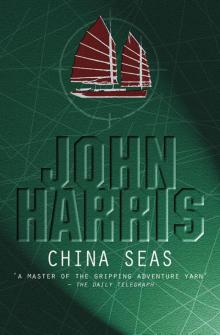 China Seas
China Seas The Mercenaries
The Mercenaries Road To The Coast
Road To The Coast The Thirty Days War
The Thirty Days War The Old Trade of Killing
The Old Trade of Killing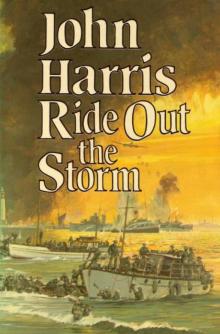 Ride Out The Storm
Ride Out The Storm Corporal Cotton's Little War
Corporal Cotton's Little War Fox from His Lair
Fox from His Lair Paint The Rainbow
Paint The Rainbow Flawed Banner
Flawed Banner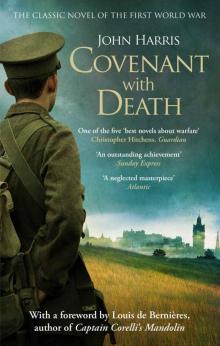 Covenant with Death
Covenant with Death So Far From God
So Far From God The Sea Shall Not Have Them
The Sea Shall Not Have Them The Cross of Lazzaro
The Cross of Lazzaro Smiling Willie and the Tiger
Smiling Willie and the Tiger Harkaway's Sixth Column
Harkaway's Sixth Column The Sleeping Mountain
The Sleeping Mountain The Claws of Mercy
The Claws of Mercy North Strike
North Strike Picture of Defeat
Picture of Defeat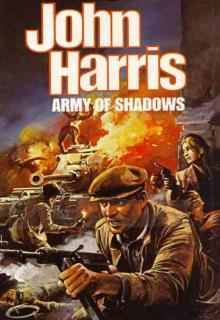 Army of Shadows
Army of Shadows Right of Reply
Right of Reply Getaway
Getaway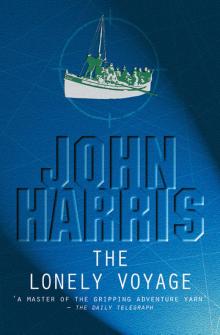 The Lonely Voyage
The Lonely Voyage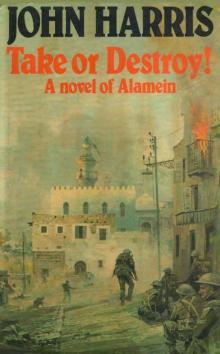 Take or Destroy!
Take or Destroy!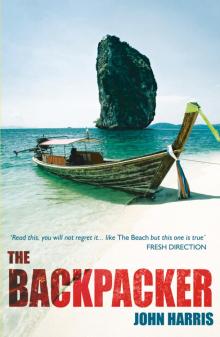 The Backpacker
The Backpacker A Funny Place to Hold a War
A Funny Place to Hold a War Swordpoint (2011)
Swordpoint (2011) A Kind of Courage
A Kind of Courage